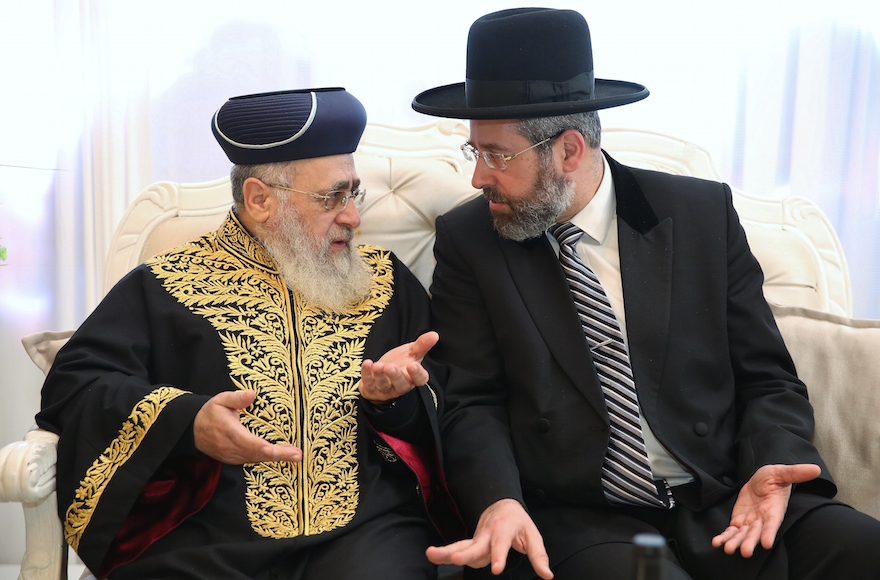Israeli Supreme Court rules state must accept non-Rabbinate Orthodox conversions
Published March 31, 2016

Israel’s Sephardic Chief Rabbi Itzhak Yosef, left, and Ashkenazi Chief Rabbi David Lau speaking at an event in Jerusalem, Jan. 11, 2016. (Yaakov Coehn/Flash90)
TEL AVIV (JTA) — Israel’s Supreme Court ruled that the state must recognize Orthodox conversions performed in Israel outside the authority of the Chief Rabbinate.
ADVERTISEMENT
The ruling Thursday means any non-citizen who converts in a private Israeli Orthodox conversion court can gain Israeli citizenship under the country’s Law of Return. Previously, converts could only gain Israeli citizenship if they converted outside of Israel and lived in a Diaspora Jewish community. Foreign conversions do not need to be Orthodox.
One-hundred-and-fifty citizens who have converted in private Israeli Orthodox conversion courts will now be seen as Jewish by the state.
The court rejected the state’s claim that only Rabbinate conversions may be considered legitimate within Israel. Because of the Jewish community’s multifaceted nature, the court ruled, any conversion performed by any Orthodox community, whether in Israel or abroad, should be recognized as valid.
“The Jewish nation is indeed one nation, but it is spread out across the world, and is composed of communities, layers and sub-layers,” the court’s decision read. Recognizing only the Chief Rabbinate “does not attribute weight to the existing range of Jewish communities — and that is unacceptable.”
The decision is largely symbolic for Israeli citizens, as those it affects will not gain any more rights or privileges. But Rabbi Seth Farber, who is active in Giyur Kahalacha, a network of private Orthodox conversion courts, said the ruling could open the door to the Rabbinate allowing converts from private courts to marry in Israel.
ADVERTISEMENT
“As long as the Interior Ministry wouldn’t recognize them, the Rabbinate didn’t have a choice whether to recognize them,” Farber said. “This says: We recognize you as part of the Jewish collective.”
Judaism for the purposes of immigration is determined by the Interior Ministry. The Chief Rabbinate controls Jewish ritual within Israel, such as marriage, divorce and burial.
The ruling is the latest blow to the Chief Rabbinate’s authority over Jewish practice in Israel. It comes about a month after a Supreme Court decision requiring Israeli public mikvahs to be used for non-Orthodox conversions.















